Key takeaways:
- Selective mutism is an anxiety disorder affecting children and can lead to a feeling of isolation in social settings, requiring understanding and support for effective communication.
- Community support plays a vital role in overcoming selective mutism, encouraging individuals to find their voice through shared experiences and safe environments.
- Local and online resources, such as support groups and dedicated forums, provide valuable connections and strategies for both individuals and families dealing with selective mutism.
- Personal stories and practical strategies, like role-playing and engaging in community activities, can lead to significant breakthroughs in communication for those affected by selective mutism.

Understanding Selective Mutism
Selective mutism is often misunderstood, but it’s more than just a reluctance to speak. I remember when I first encountered a child struggling with this condition, quietly observing while others chatted away. It made me wonder, what must it feel like to be trapped in your own thoughts, longing to express yourself but unable to find the words?
At its core, selective mutism is an anxiety disorder that primarily affects children, though it can persist into adulthood. I’ve seen how it stems from deep-seated fears, with social settings turning into overwhelming experiences. Can you imagine feeling paralyzed in a room full of familiar faces, wanting to engage but feeling like a mute spectator?
Some people might think that it’s simply shyness, but the emotional weight is much heavier. In my experience, I’ve witnessed moments where a gentle nudge or a safe space made all the difference in encouraging a voice. How can we help those affected feel supported and understood, transforming the silence into a gradual journey of expression?
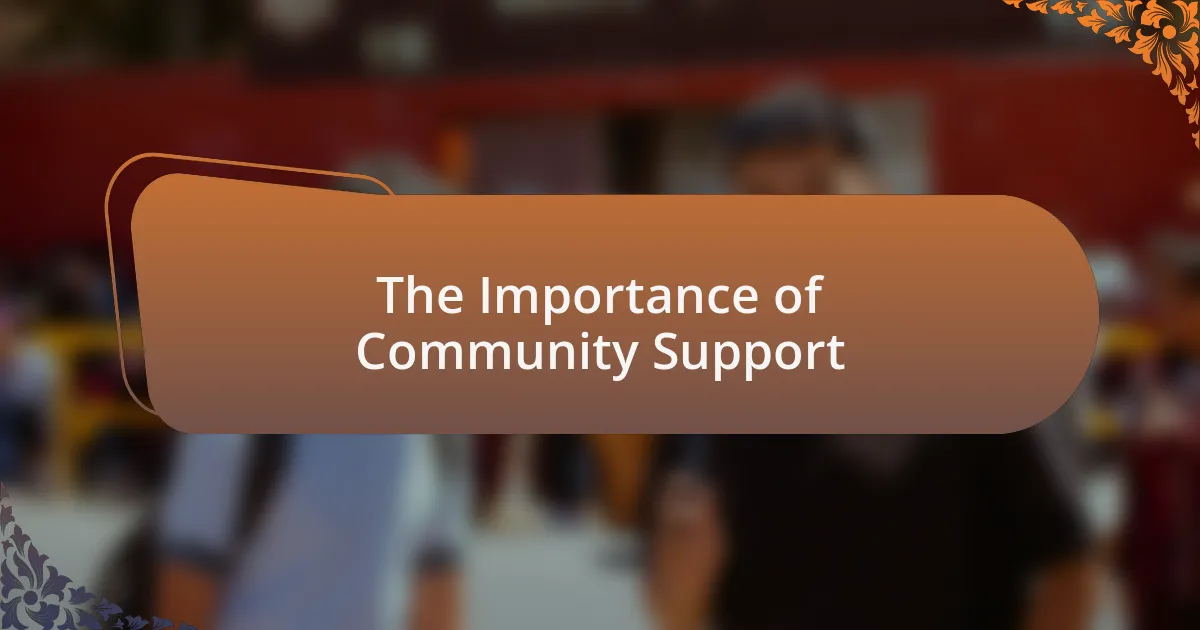
The Importance of Community Support
Building a supportive community for individuals with selective mutism is crucial. I recall a workshop I attended where parents of children with this condition shared their journeys. It struck me how the simple act of finding others who understood their struggles helped them feel less isolated. What is it about shared experiences that fosters such a strong sense of belonging?
In my observations, community support plays a transformative role in overcoming the hurdles associated with selective mutism. I’ve seen parents connecting through local support groups, exchanging tips on creating comfortable environments for their children to express themselves. This exchange not only empowers them but also forms a network of understanding, where one’s courage to speak can inspire another. Isn’t it fascinating how encouragement can ripple out and touch so many lives?
Moreover, having a solid support system creates opportunities for individuals to practice communication in safe spaces. I remember attending an event where children engaged in playful activities designed to encourage speech without pressure. Witnessing their gradual confidence grow reminded me that community support could be a lifeline, helping them step beyond their silence. Could community involvement be the key that unlocks a world of expression for those who feel muted?

Ways to Find Support Groups
Finding support groups can start right in your neighborhood. I remember when I first searched for local resources; I went to community centers and libraries, where I often stumbled upon flyers for support groups. Have you checked bulletin boards in places like schools or cafes? They can be treasure troves of information.
Online platforms are another fantastic avenue. I’ve found that social media groups, dedicated forums, and even specific apps offer a wealth of connections. When I joined a Facebook group focused on selective mutism, the immediate sense of community was refreshing, as if I had discovered a warm, welcoming space amid the vast digital landscape. Isn’t it reassuring to think that a few clicks can connect you with others who truly understand your challenges?
Peer-led groups can also be invaluable. I attended a meetup organized by parents navigating selective mutism, where we shared strategies and personal stories. What struck me was how every participant contributed to a shared understanding, enriching the conversation with diverse experiences. Have you ever left a meeting feeling lighter and more empowered? That’s the magic of finding the right support group—it transforms individual struggles into a collective journey toward growth.
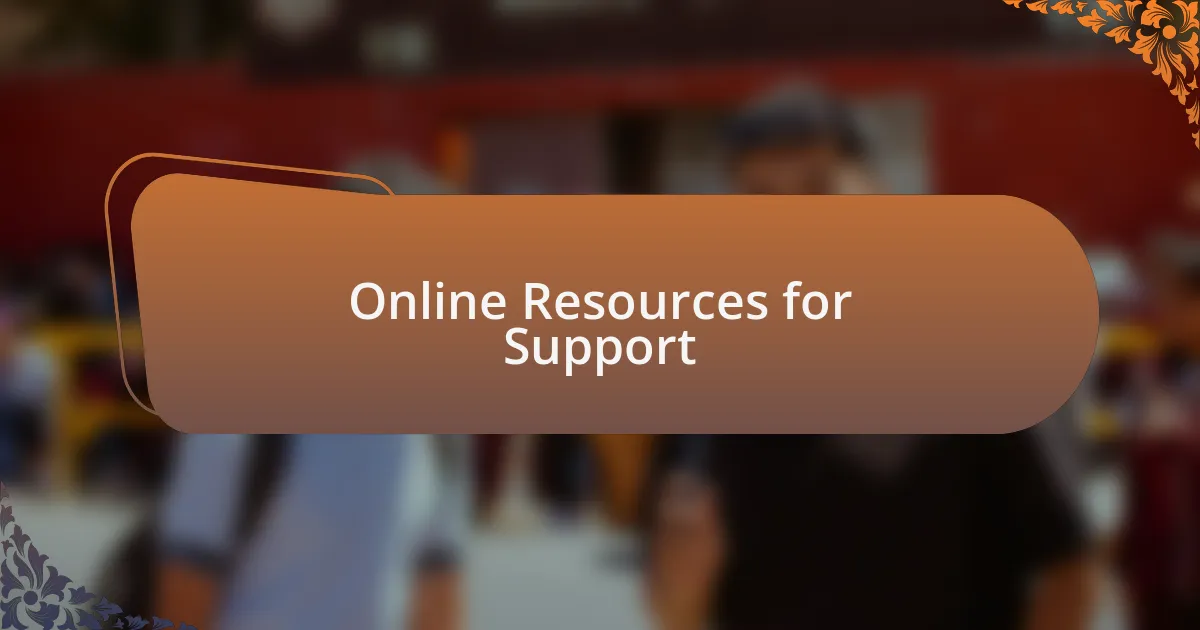
Online Resources for Support
Finding online resources for support can truly transform your journey with selective mutism. I remember when I first discovered websites dedicated to this topic; they offered a treasure trove of articles, personal stories, and discussions that helped me feel less isolated. Have you ever felt overwhelmed searching for answers? Those comprehensive resources were a lifeline, providing insights and comfort when I needed it most.
Social media platforms have been particularly instrumental in my experience. I joined several groups on Instagram and Twitter where parents and individuals share their daily challenges and triumphs regarding selective mutism. One day, I stumbled upon a heartfelt post from a parent sharing their child’s breakthrough moment. It brought tears to my eyes and left me pondering about our own victories—big or small—along this path. Might these shared experiences help you see your journey in a new light?
Online forums can be an amazing platform for discussion. I distinctly remember participating in a dedicated chat room one evening, where I connected with others who had faced similar hurdles. Sharing my own story about a particularly tough day made me realize how powerful it is to simply be heard and understood. Have you experienced that sense of acceptance? It can be a reminder that, even when our voices may falter in the real world, there’s a virtual community ready to lift us up with empathy and support.
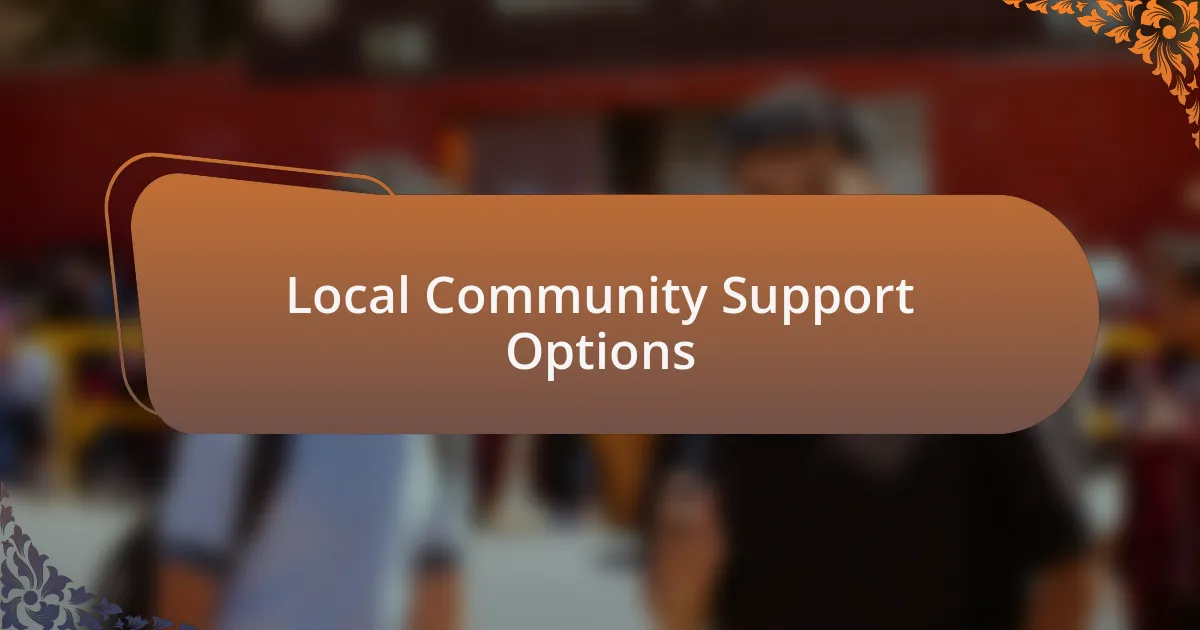
Local Community Support Options
When I began looking for local community support options, I was pleasantly surprised by how many resources were available right in my own backyard. Local support groups can provide a safe haven for both individuals experiencing selective mutism and their families. I vividly recall attending my first meeting; it was heartwarming to chat with other parents who truly understood my concerns. Have you ever felt that sense of relief when you find people who just get it?
I also found that local schools often have access to valuable resources. Many teachers and counselors are equipped with strategies to help children communicate more comfortably. I remember discussing my child’s challenges with a supportive school counselor who offered practical tips and encouraged peer engagement. It made me realize that schools can play a pivotal role in fostering a nurturing environment. Have you considered reaching out to local educators for insights?
Another option that has worked wonders is connecting with local therapists who specialize in selective mutism. I recall meeting a therapist whose approach was not only professional but also incredibly compassionate. She shared various techniques that blended play and gradual exposure, making it less intimidating for my child to find their voice. This experience made me appreciate the value of tailored local support. Have you had a chance to explore the expertise available in your community?
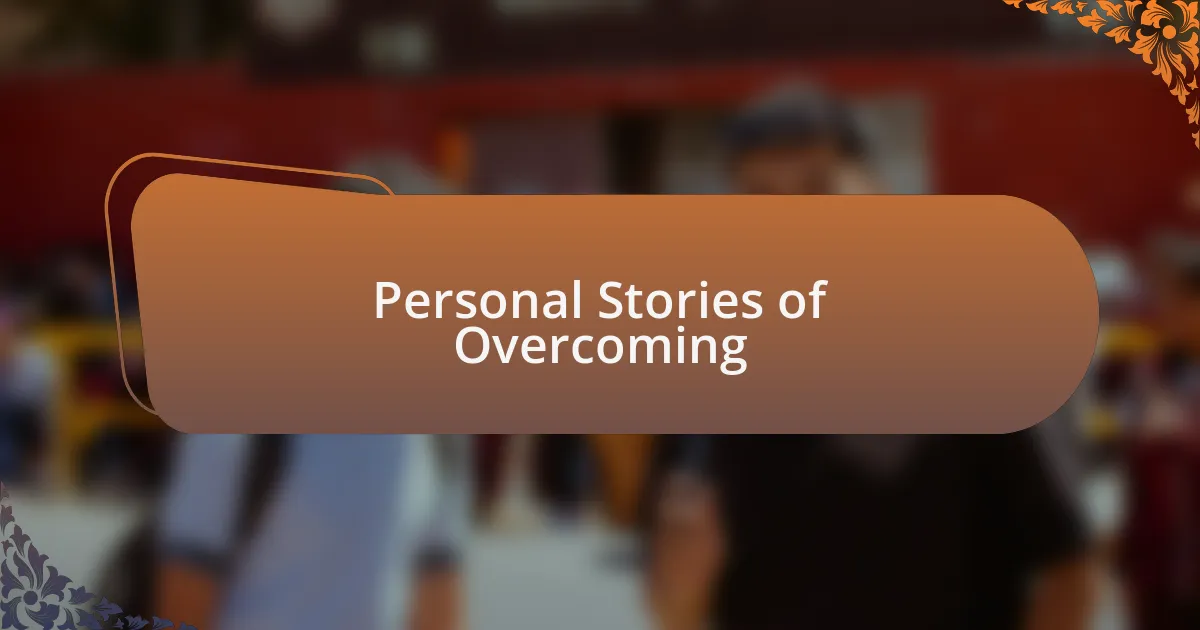
Personal Stories of Overcoming
When I think back to my journey, one moment stands out vividly: attending a community event focused on selective mutism. I sat in a circle with other parents, our stories overlapping like threads in a tapestry. Listening to their struggles, I felt a powerful sense of acceptance wash over me—have you ever experienced that moment when you realize you’re not alone in your fight?
I remember a particular family sharing how role-playing at home transformed their child’s willingness to speak. They talked about creating scenarios that mirrored real-life situations, which made communication feel less daunting for their daughter. It struck me how these small, creative steps could lead to significant breakthroughs. Have you thought about implementing similar strategies at your home?
As I engaged more with this community, I gained insights that directly impacted my approach to overcoming selective mutism. One parent shared their success story involving a local theater group that encouraged children to express themselves through drama. Inspired, I finally took the leap to enroll my child in a similar program. Watching them blossom on stage brought tears of joy to my eyes—what a beautiful reminder that support systems can lead to remarkable transformations!
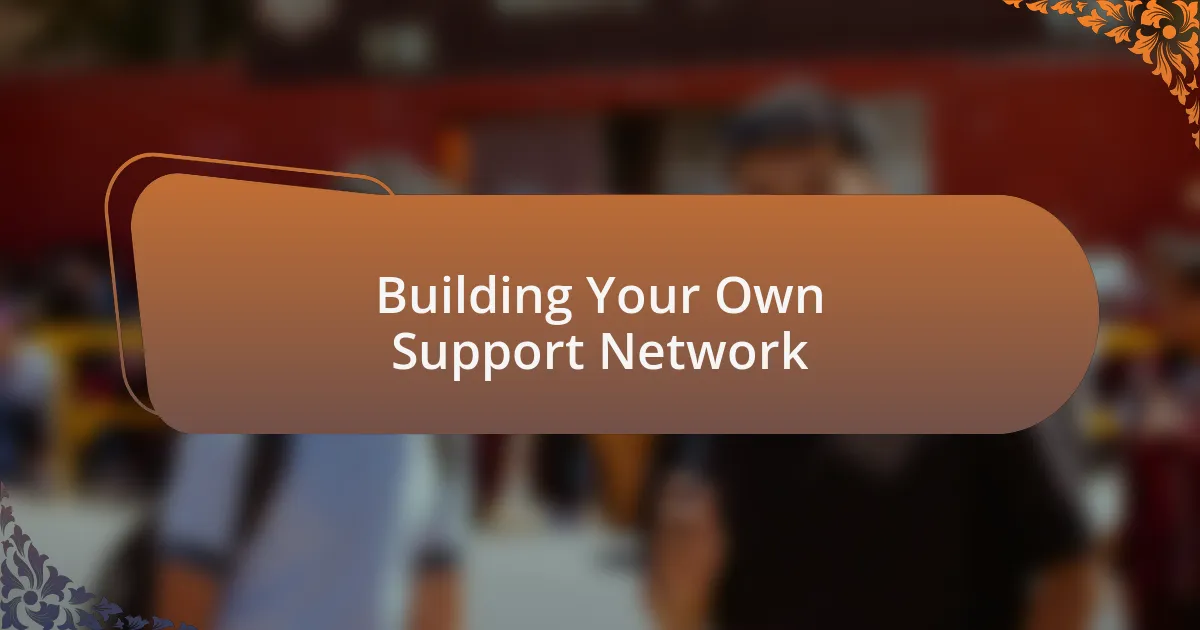
Building Your Own Support Network
Building a support network can feel daunting initially, but I found that reaching out to others who understand selective mutism makes all the difference. I recall joining an online support group and feeling an immediate sense of belonging. Have you ever been in a space where everyone just ‘gets it’? The shared experiences opened my eyes to new strategies and resources that I hadn’t considered before.
One thing I discovered is that local parent meetups can be incredibly beneficial. At one such gathering, I met a parent whose child had made remarkable strides thanks to a dedicated therapist. Listening to their story sparked a thought in me—what if I tried a similar approach? It was empowering to know that there were multiple avenues of support, just waiting to be explored.
I also learned the importance of being active in my local community. By volunteering at regional events focused on mental health, I connected with professionals and other families. This engagement not only increased my knowledge but also strengthened my network. Have you considered how your local resources could support your journey? Each connection became a building block in my support system, creating a web of encouragement and understanding.